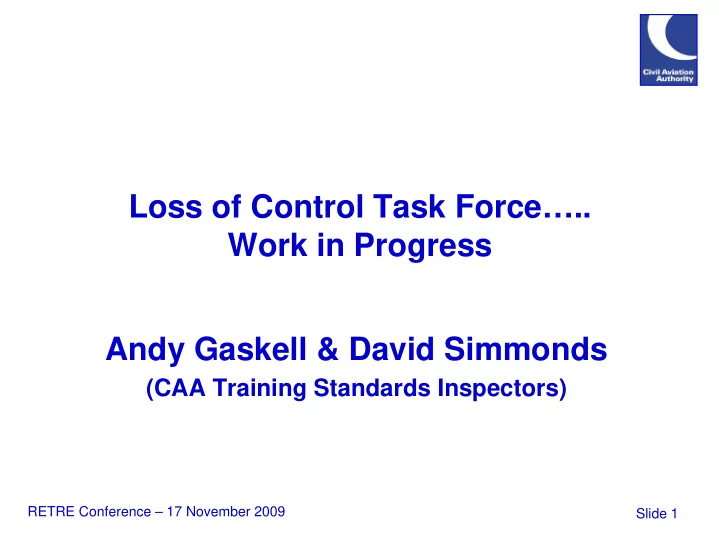

Loss of Control Task Force….. Work in Progress Andy Gaskell & David Simmonds (CAA Training Standards Inspectors) RETRE Conference – 17 November 2009 Slide 1
Loss of Control Task Force 1. Purpose 2. Scope 3. Background 4. Participants 5. LoCTF methodology 6. Some of our thoughts about possible output 7. Your questions, feedback and ideas! RETRE Conference – 17 November 2009 Slide 2
Purpose To work with aircraft operators, training organisations and other stakeholders to establish the key risks that lead to loss of control, and to recommend strategies for monitoring and reducing these risks. RETRE Conference – 17 November 2009 Slide 3
Scope Loss of control events: involving flight crew human factors. - in public transport aircraft greater than 5,700 kg. - excluding those occurring in landing flare or resulting in - runway excursion. RETRE Conference – 17 November 2009 Slide 4
Background Safety Performance Indicator (SPI) 2 high-risk occurrences to Public Transport aircraft. - increasing rate since Jan 2006 (especially to June 2008). - Jan 2009: CAA Safety Conference Apr 2009: SPI2 Working Group July 2009: Loss of Control Task Force Jan 2010: Report to SRG Exec Committee RETRE Conference – 17 November 2009 Slide 5
Participants CAA AAIB Airlines Aviation Organisations Military RETRE Conference – 17 November 2009 Slide 6
Participants - CAA Captain David McCorquodale - Head of Flt Crew Stds (Chairman) Training Standards Inspectors (6) Captain Steve Oddy - Staff Flight Examiner Dr Robert Hunter - Head of Aeromedical Certification David Wright - FDM Specialist & Research Project Manager Rowan Christou - Strategic Analyst RETRE Conference – 17 November 2009 Slide 7
Participants - non-CAA Captain Margaret Dean – Senior Inspector AAIB Air Cdre Richard Jones CBE – Chief Executive UKFSC Captain Simon Wood – FORCE Simon Grace – Thomas Cook Airlines Phil Luxton – Airbus Flt Safety Officer, Thomson Airways Captain Alex Fisher – GAPAN Wg Cdr Rupert Clark RAF – OC Examining Wing, HQ CFS Flt Lt Chris Eccles RAF – CFS Multi Engine Examiner Lt Cdr Jim Reed RN – MOD DARS RETRE Conference – 17 November 2009 Slide 8
LoCTF Methodology Brainstorm Problems Solutions Review of published work Data analysis – Phase 1 Worldwide Fatal Accidents 1998-2007 >5700kg Excl. Technical, Icing, Flare and Runway Excursions Data analysis – Phase 2 High Severity Occurrences (MOR Database) Does Phase 1 analysis relate to Europe/UK? RETRE Conference – 17 November 2009 Slide 9
All stages of the Task Force’s work indicated that…. Loss of Control is a Major Hazard to all UK Operators RETRE Conference – 17 November 2009 Slide 10
Brainstorming - Problems Monitoring Stall training Handling skills Training manuals RETRE Conference – 17 November 2009 Slide 11
Brainstorming - Solutions ATQP - ITQI Multi-Crew Pilots Licence syllabus Simulator performance Jet Orientation Course Pilot selection Monitoring skills training Handling skills training Type rating course content & structure Content of Licence Skill Test & Licence Proficiency Check ‘Gotchas’ Open / non-jeopardy reporting system RETRE Conference – 17 November 2009 Slide 12
Data Analysis – Phase 1 Indicated a need for these remedial actions (Top 5): • Manual Flying Skills Training • Monitoring Skills • Human Factors Training • Upset Recovery Training • Disregard of SOPs RETRE Conference – 17 November 2009 Slide 13
What can we do? Operators Encourage operators to acknowledge the risks and address them in their training programmes. UK CAA National changes to the way in which regulation is implemented. EASA Regulatory requirements (especially Licensing). RETRE Conference – 17 November 2009 Slide 14
Recommendations being considered: Alternative Training Qualification Programme – Not a solution but effective vehicle – Universal enthusiasm – Increased opportunities for training – Training driven by risk assessment Promote uptake of ATQP (Operators and CAA) Assist 0perators with compliance (CAA) Support IATA Training Qualification Initiative – ITQI (CAA) Entry requirements are currently under review (EASA) RETRE Conference – 17 November 2009 Slide 15
Recommendations being considered: Multi-Crew Pilots Licence (MPL) • Review content (EASA) • Extreme manoeuvres module (EASA) Simulator Performance • Additional data from aircraft manufacturers to expand LoC training capability (EASA) Type Rating Course Content & Structure • One size fits all • Review for highly-automated aeroplanes (EASA) Content of LST & LPC • Tailor to aircraft type (EASA) • Demonstrate competence with automation (EASA) RETRE Conference – 17 November 2009 Slide 16
Recommendations being considered: Manual Flying Skills (operator) – Stalling and Upset Recovery training – If you HAVE to fly manually, something is probably wrong Monitoring Skills Training (operator) – Active monitoring – Recognising when things are going wrong – When to intervene – Intervention strategies – Human Factors skills RETRE Conference – 17 November 2009 Slide 17
Recommendations being considered: Automation Training (operator) – ‘Holistic’ approach to automation training – Understanding functionality – Managing energy and flightpath using automation – Training Line Skills in the Simulator – What are the ‘Gotchas’? Company ‘Open’ Reporting System (operator) – CHIRP principle – Maximise data awareness RETRE Conference – 17 November 2009 Slide 18
Other thoughts: • Must not lose what we’ve got! • Loss of control may be initiated by minor technical failure • Are instructors always up to the job? • Jet Orientation Course highly desirable • Content of manuals – limited by concerns for liability • Solutions lie more in automation training than manual flying skills • Pilot selection RETRE Conference – 17 November 2009 Slide 19
In summary: Work in progress • Loss of Control is a real risk to UK operators • Timely opportunity for regulatory change • Challenge for industry • Re-focussed training, not necessarily more training • ATQP provides opportunities • No single ‘silver bullet’ solution • RETRE Conference – 17 November 2009 Slide 20
The team believes that a coordinated approach between the regulators and industry will be the most effective solution Over to you! RETRE Conference – 17 November 2009 Slide 21
Recommend
More recommend